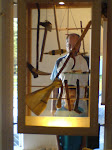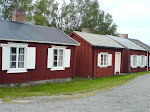söndag 1 juli 2007
Pippi Longstocking…
It stands about Pippi Longstocking at least twice in the anthology over Astrid Lindgren.
The story about Pippi was first verbally told to the daughter Karin, who was born 1934, on her request (so this occurred in the beginning or midst of the forties?):
“Mom, tell me about Pippi Longstocking!!” (it was her daughter which invented the figure Pippi Longstocking).
Astrid did. This was before she had published any book whatsoever. And I think the original Pippi was even more rebellious than the Pippi we know and as I read once.
1995 a Swedish Christ-democrat Carin Stenström published a debate-article, on the international women’s day, in one of our biggest newspapers about Pippi Longstocking. Where we could see, according to the former Swedish culture-minister Bengt Göransson, that “Pippi Longstocking’s anarchistic appearance still is strongly provoking for the one which with the help of a strict and not questioned moral want to regulate even individuals lives”.
Another contributor to the anthology writes:
“That Pippi provoked many pedagogues and some year after it was published caused a lively discussion, called the Pippi-feud, is well-known. Even fifty years later the Pippi-figure still has its challenging character and give rise to new exchanges of opinions.”
This contributor also mentions the debate-article by Carin Stenström, with the headline “Time to pension Pippi Longstocking?” Stenström said in this article that she already as a child had seen something grown up was unable to see, namely that Pippi was gravely asocial, that she was emotionally disturbed, and that she lacked all abilities to adapt and lacked all normal ties to other human beings. She continues with analyzing what she calls the “Pippi-culture” and its influence on school and child-raising in Sweden.
She means that in no other country childhood has been made its own goal, nowhere else the infantilism has been elevated to norm and wisdom as with us. The worship of Pippi has put everything up-side-down; the school, family life, normal behaviors. It has ridiculed order and respect, honesty and politeness. It glorifies self-centredness, self fixation, ruthlessness, and escapism she thought.
This attack proves if nothing else the belief in the literature’s possibility to influence (And is that why conservatives, and the right that is now our present government since September 2006, is so afraid of culture??? My small wonder).
When Astrid Lindgren had held her speech 1978 “Never violence” (“Aldrig våld”) she got a lotof reactions. She understood it would be challenging to many. A German vicar wrote a long letter to her and expressed his worries and disappointment, but at the same time also expressed his admiration for her. He means that Lindgren interprets the Old Testament and thus the bible as the cause for all violence children are exposed to by their caretakers. He means that she is citing one-sidedly and fails lifting the parts in the Bible forward which speaks against violence.
Other critics of her view on children and child-raising are less thoughtful and well articulated. One opens his letter with establishing that Lindgren needs a “jolly good birching” (rejäl risbastu). The reasons for the writer of the letters anger are all mischief (hyss) Emil is allowed to make. And the letter continues with establishing that children deserve “a beating” if hey destroy and in respect for older.
A Swedish woman tells another story about using “Lotta on the Troublemakers-street” (“Lotta på Bråkmakargatn” in Swedish) as literature when she should teach Chinese toll-polices English. The book not only improved the English but led, even more, to lively discussions about raising-principles and create many good laughs. And probably also to a partly other view on how small girls are allowed to behave!!!
Yes, there are many backlashes in the society… And what is infantilism? I wonder if it is what some therapists call being in the child state, which has reasons, and thus is possible to cure – and to prevent too, which would be even better. But not with abuse or violation, i.e., more of that kind, not more of that which caused suppression and to stay more or less in a child state, but via processing of the roots for this state, by talking about it…
And it isn’t enough with only cognitive or intellectual knowledge. To change things more radically (and not only on the surface) we should need to understand those things more on an emotional level. Not until then we can avoid harming children either I think… We should need to sensitize us for what we as adults were harmed by – on an emotional level to a certain degree…
And I came to think once again about what Pincus has written about bigotry (trångsynthet) and the roots for this according to him (and I think he is right!!! People who are abused and violated, but not with the severest abuse or those that had the luck to encounter helping witnesses during childhood and thus didn’t need to resort to either being criminals or abusers of other kinds, more subtly), which persons like that Carin Stenström above maybe showed!!?? Yes, personally I think she rather show that??? Honestly.
See the blogpost Pincus on Frank McCourt.
As others in societies all over the world it seems, which shouts for harder holds/grips again. And now stronger than before or stronger than for a long time? Nanny-programs are one expression of this phenomenon?
But from where does disrespect and rudeness come? But at the same time, that’s only an explanation and not an excuse for grown ups… You can’t excuse your bad behavior with your upbringing and childhood... As grown up we have the possibility to do something about it. But probably with a lot of work and may failures…
Came to think about what Bosch has written about teaching children not to be egoistic (can this also have resulted in the opposite?? Another side of the same coin? An against-reaction in some parents?). Maybe I will write a blogpost about this later…
The story about Pippi was first verbally told to the daughter Karin, who was born 1934, on her request (so this occurred in the beginning or midst of the forties?):
“Mom, tell me about Pippi Longstocking!!” (it was her daughter which invented the figure Pippi Longstocking).
Astrid did. This was before she had published any book whatsoever. And I think the original Pippi was even more rebellious than the Pippi we know and as I read once.
1995 a Swedish Christ-democrat Carin Stenström published a debate-article, on the international women’s day, in one of our biggest newspapers about Pippi Longstocking. Where we could see, according to the former Swedish culture-minister Bengt Göransson, that “Pippi Longstocking’s anarchistic appearance still is strongly provoking for the one which with the help of a strict and not questioned moral want to regulate even individuals lives”.
Another contributor to the anthology writes:
“That Pippi provoked many pedagogues and some year after it was published caused a lively discussion, called the Pippi-feud, is well-known. Even fifty years later the Pippi-figure still has its challenging character and give rise to new exchanges of opinions.”
This contributor also mentions the debate-article by Carin Stenström, with the headline “Time to pension Pippi Longstocking?” Stenström said in this article that she already as a child had seen something grown up was unable to see, namely that Pippi was gravely asocial, that she was emotionally disturbed, and that she lacked all abilities to adapt and lacked all normal ties to other human beings. She continues with analyzing what she calls the “Pippi-culture” and its influence on school and child-raising in Sweden.
She means that in no other country childhood has been made its own goal, nowhere else the infantilism has been elevated to norm and wisdom as with us. The worship of Pippi has put everything up-side-down; the school, family life, normal behaviors. It has ridiculed order and respect, honesty and politeness. It glorifies self-centredness, self fixation, ruthlessness, and escapism she thought.
This attack proves if nothing else the belief in the literature’s possibility to influence (And is that why conservatives, and the right that is now our present government since September 2006, is so afraid of culture??? My small wonder).
When Astrid Lindgren had held her speech 1978 “Never violence” (“Aldrig våld”) she got a lotof reactions. She understood it would be challenging to many. A German vicar wrote a long letter to her and expressed his worries and disappointment, but at the same time also expressed his admiration for her. He means that Lindgren interprets the Old Testament and thus the bible as the cause for all violence children are exposed to by their caretakers. He means that she is citing one-sidedly and fails lifting the parts in the Bible forward which speaks against violence.
Other critics of her view on children and child-raising are less thoughtful and well articulated. One opens his letter with establishing that Lindgren needs a “jolly good birching” (rejäl risbastu). The reasons for the writer of the letters anger are all mischief (hyss) Emil is allowed to make. And the letter continues with establishing that children deserve “a beating” if hey destroy and in respect for older.
A Swedish woman tells another story about using “Lotta on the Troublemakers-street” (“Lotta på Bråkmakargatn” in Swedish) as literature when she should teach Chinese toll-polices English. The book not only improved the English but led, even more, to lively discussions about raising-principles and create many good laughs. And probably also to a partly other view on how small girls are allowed to behave!!!
Yes, there are many backlashes in the society… And what is infantilism? I wonder if it is what some therapists call being in the child state, which has reasons, and thus is possible to cure – and to prevent too, which would be even better. But not with abuse or violation, i.e., more of that kind, not more of that which caused suppression and to stay more or less in a child state, but via processing of the roots for this state, by talking about it…
And it isn’t enough with only cognitive or intellectual knowledge. To change things more radically (and not only on the surface) we should need to understand those things more on an emotional level. Not until then we can avoid harming children either I think… We should need to sensitize us for what we as adults were harmed by – on an emotional level to a certain degree…
And I came to think once again about what Pincus has written about bigotry (trångsynthet) and the roots for this according to him (and I think he is right!!! People who are abused and violated, but not with the severest abuse or those that had the luck to encounter helping witnesses during childhood and thus didn’t need to resort to either being criminals or abusers of other kinds, more subtly), which persons like that Carin Stenström above maybe showed!!?? Yes, personally I think she rather show that??? Honestly.
See the blogpost Pincus on Frank McCourt.
As others in societies all over the world it seems, which shouts for harder holds/grips again. And now stronger than before or stronger than for a long time? Nanny-programs are one expression of this phenomenon?
But from where does disrespect and rudeness come? But at the same time, that’s only an explanation and not an excuse for grown ups… You can’t excuse your bad behavior with your upbringing and childhood... As grown up we have the possibility to do something about it. But probably with a lot of work and may failures…
Came to think about what Bosch has written about teaching children not to be egoistic (can this also have resulted in the opposite?? Another side of the same coin? An against-reaction in some parents?). Maybe I will write a blogpost about this later…
Prenumerera på:
Kommentarer till inlägget (Atom)





























Inga kommentarer:
Skicka en kommentar